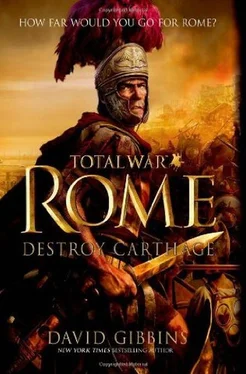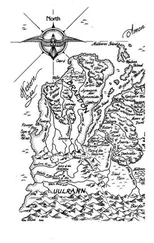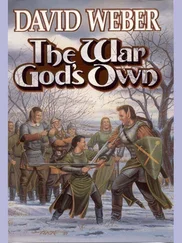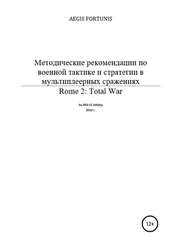David Gibbins - Total War Rome - Destroy Carthage
Здесь есть возможность читать онлайн «David Gibbins - Total War Rome - Destroy Carthage» весь текст электронной книги совершенно бесплатно (целиком полную версию без сокращений). В некоторых случаях можно слушать аудио, скачать через торрент в формате fb2 и присутствует краткое содержание. Год выпуска: 0101, Издательство: Thomas Dunne Books, Жанр: Исторические приключения, на английском языке. Описание произведения, (предисловие) а так же отзывы посетителей доступны на портале библиотеки ЛибКат.
- Название:Total War Rome: Destroy Carthage
- Автор:
- Издательство:Thomas Dunne Books
- Жанр:
- Год:0101
- ISBN:нет данных
- Рейтинг книги:5 / 5. Голосов: 1
-
Избранное:Добавить в избранное
- Отзывы:
-
Ваша оценка:
- 100
- 1
- 2
- 3
- 4
- 5
Total War Rome: Destroy Carthage: краткое содержание, описание и аннотация
Предлагаем к чтению аннотацию, описание, краткое содержание или предисловие (зависит от того, что написал сам автор книги «Total War Rome: Destroy Carthage»). Если вы не нашли необходимую информацию о книге — напишите в комментариях, мы постараемся отыскать её.
Total War Rome: Destroy Carthage — читать онлайн бесплатно полную книгу (весь текст) целиком
Ниже представлен текст книги, разбитый по страницам. Система сохранения места последней прочитанной страницы, позволяет с удобством читать онлайн бесплатно книгу «Total War Rome: Destroy Carthage», без необходимости каждый раз заново искать на чём Вы остановились. Поставьте закладку, и сможете в любой момент перейти на страницу, на которой закончили чтение.
Интервал:
Закладка:
‘You gave her up for Rome, and for your destiny. And Julia lives on with you now in your son.’
Scipio looked at the image on the coin again, and held it ready to toss. ‘If that’s Julia, she’s my call, then.’
‘And mine’s Rufius.’
Scipio flicked the coin on his thumb and it spun high into the air, flashing silver in the sky, then falling and bouncing on the stone pavement of the harbour front, the horsemen and the dog facing up.
Scipio turned and peered at him. ‘Rufius it is. You will lead the first maniple through the breach in the wall. You will finally have a chance at that crown.’
Fabius kicked the coin into a crack between the stones, and turned to Scipio, standing to attention. ‘ Ave atque vale, Scipio. Until we meet again, in this world or the next.’
Scipio slapped him on the shoulder. ‘ Ave atque vale, Fabius. Go now and gird yourself for war.’
23
A quarter of an hour later, Fabius stood with Scipio and Polybius again on the tower. He could feel the tension in the air, the edginess as they knew the time for action was approaching fast. Polybius pointed along the foreshore to the west, where the Roman fleet stood just out of bowshot range from the walls. ‘The wind is still coming from the south. Ennius is worried that it will blow the flames back over our own ships. You must give the order before the wind picks up much more.’
‘That’s exactly why I don’t like him messing with fire,’ Scipio grumbled. ‘I’ve been telling him that for twenty years. I wish he’d stick to catapults and battering rams.’
‘The die is cast, Scipio. And as for battering rams, he’s got those in place too. Look, they’re already swinging.’
Fabius peered down at the Carthaginian defences just inside the city from the edge of the harbour. Out of sight to the south, beyond the great wall that protected the city from the isthmus, Ennius’ cohort had spent several weeks building a battering ram of conventional design, a huge timber made from a single cedar of Lebanon shipped over specially for the purpose, capped with a bronze ram in the shape of a boar’s head taken from one of the triremes anchored offshore. It took more than a thousand men to wield it, and it would be the only way they could hope to break through the massive southern gateway.
But here beside the harbour it was a different matter: the walls blocking the streets had been hastily constructed by the Carthaginians in the past few weeks when they knew the Romans were coming. Ennius had spotted the structural weakness of the masonry, built in the Carthaginian manner with tall upright stones a few paces apart, the spaces between filled with courses of smaller blocks. The pillars had strength, but a ram aimed between them could easily break through. The Carthaginians had realized this and placed the walls at angles in the streets where they thought a ram could not be brought to bear, where the open space before the wall was too small for the run-up needed to punch a hole big enough for an assaulting force to break through.
But they had been wrong; they had not counted on Roman engineering genius. Ennius had demonstrated his invention on an abandoned villa with walls built in this fashion just outside the city, and Scipio had been convinced. He could see Ennius’ machines now, poking above the flat rooftops, triangular wooden frames that had been pushed on wheels close to the walls, with rams a hundred feet long suspended from ropes like pendulums. Ennius had built them using material his men had salvaged from the ruined warships in the harbour, from masts, ropes and iron rams, turning the last vestiges of Carthaginian naval might against the city, while the Carthaginians themselves had been reduced to using women’s hair to make rope for catapults. And these rams did not take thousands of men to operate, only a few dozen each; those men were specialized marines from the galleys, trained to help the slaves row in the final assault on an enemy fleet, and then as they struck home to leap off their benches and surge forward into the attack. Once the men swinging the rams had breached the walls and crashed through, the massed legionaries waiting behind would follow and the city would be open to conquest.
Fabius peered at the rams again. Polybius was right. They were swinging already, marking time, the teams waiting for the order that would see the ropes pulled taut and the rams crash into the walls. It was as if the engine of war were beginning to flex itself, inexorably. He felt his pulse quicken. It was nearly time.
Polybius pointed to an open area just inside the Carthaginian defensive wall about five hundred paces to the south of the harbour. ‘There’s smoke coming from the Tophet,’ he said.
‘What of it?’ Scipio replied, still looking at the rams.
‘Do you know what Tophet means?’
‘I don’t speak Carthaginian.’
‘It means “roasting place”.’
‘Well?’
‘The sanctuary is used to cremate and bury dead children, but in the past was used as a place of sacrifice. It hasn’t been used for that purpose for generations now, not since before the war with Hannibal. But rumour has it that in times of great duress, a sacrifice would be offered to the god Ba’al Hammon, who supposedly resides on the twin peaks of the mountain to the east. When the morning sun rises above the mountain it casts a beam of light across the Tophet, and that’s when the sacrifice is meant to take place.’
‘I don’t think sacrifice can save them now. And that first shaft of light is when I will order the assault.’
Polybius took out a bronze tube about a foot long with discshaped crystals at either end, and peered through it in the direction of the smoke. ‘There are two priests in white robes mounting the stone platform in the centre of the sanctuary, each carrying a coiled chain and wearing what look like large gloves made of leather — elephant hide I shouldn’t wonder. And that strange structure that looks like a large kiln behind is the source of the smoke. There are slaves at the bottom working bellows, stoking a fire. If you ever wondered where Hasdrubal put the olive trees he had his men cut down from the surrounding fields, there’s your answer. Piles of it behind the kiln, clearly firewood. And there are men with sledge-hammers smashing the kiln, only it’s not a kiln at all. It’s something else entirely, concealed beneath.’
He passed the eyeglass to Fabius, who squinted down it, saw only a distorted blur and passed it back. They all stared at what was being revealed. It was fire-blackened and mottled on the surface from fire, but clearly made of bronze. As the men knocked away the final sections of clay the shape came into view. It was a gigantic squatting figure, the size of several elephants, human in form but of monstrous proportions. Its huge arms were raised palms upwards, and its bearded head was set back with the mouth open wide, large enough for a man to enter. They could see the smoke issuing from the mouth, and an occasional lick of flame from a fire below.
‘Extraordinary,’ Polybius muttered. ‘It’s mentioned by the historians, but nobody really believed it. Unless I’m mistaken, it’s meant to represent the Carthaginian god Ba’al Hammon.’ He peered through the eyeglass again. ‘Hasdrubal has just arrived, and is mounting the steps to the platform where the two priests are waiting. He’s got gloves on too.’
Fabius shaded his eyes to get a better view. He remembered the first time he had seen the Carthaginian general, when he and Scipio had made their reconnaissance into the city three years before; Hasdrubal had been wearing the distinctive lionskin over his armour then too. He saw Scipio glancing at the ships and the harbour, waiting for Ennius’ signal, then looking back at the Tophet. ‘Where’s the sacrificial animal? I thought they’d have eaten everything by now, rats and cockroaches included.’
Читать дальшеИнтервал:
Закладка:
Похожие книги на «Total War Rome: Destroy Carthage»
Представляем Вашему вниманию похожие книги на «Total War Rome: Destroy Carthage» списком для выбора. Мы отобрали схожую по названию и смыслу литературу в надежде предоставить читателям больше вариантов отыскать новые, интересные, ещё непрочитанные произведения.
Обсуждение, отзывы о книге «Total War Rome: Destroy Carthage» и просто собственные мнения читателей. Оставьте ваши комментарии, напишите, что Вы думаете о произведении, его смысле или главных героях. Укажите что конкретно понравилось, а что нет, и почему Вы так считаете.












